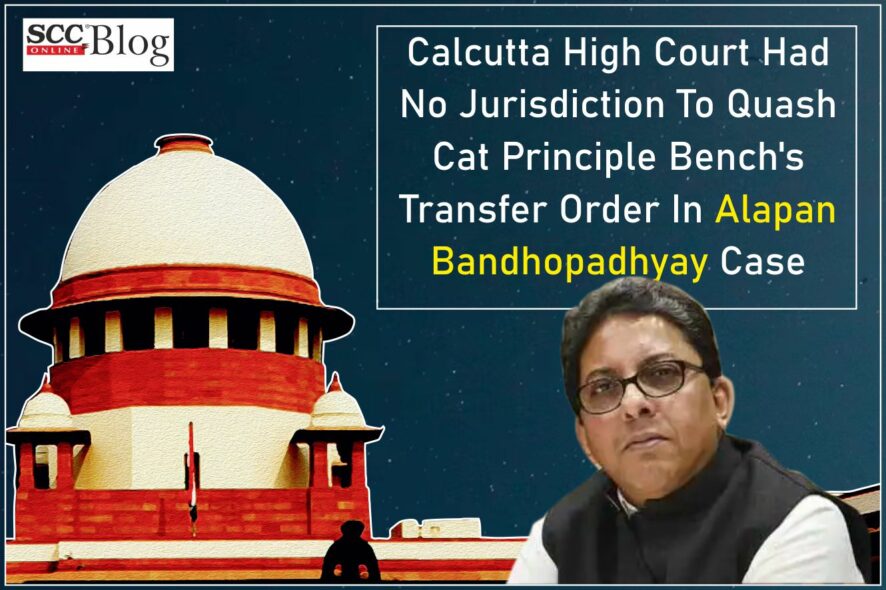Supreme Court: The 2-judge bench of AM Khanwilkar and CT Ravikumar, JJ has reiterated the position laid down by the Constitution Bench in L. Chandra Kumar v. Union of India, (1997) 3 SCC 261, that any decision of such a Tribunal, including the one passed under Section 25 of the Administrative Tribunals Act, 1985 could be subjected to scrutiny only before a Division Bench of a High Court within whose jurisdiction the Tribunal concerned falls.
The Constitution Bench had held that “all decisions of Tribunals created under Article 323A and Article 323B of the Constitution will be subject to the scrutiny before a Division Bench of the High Court within whose jurisdiction the concerned Tribunal falls.”
The Court, hence, explained that the expression “all decisions of these Tribunals” used by the Constitution Bench will cover and take within its sweep orders passed on applications or otherwise in the matter of transfer of Original Applications from one Bench of the Tribunal to another Bench of the Tribunal in exercise of the power under Section 25 of the Act.
The Court, hence noticed that,
“This unambiguous exposition of law has to be followed scrupulously while deciding the jurisdictional High Court for the purpose of bringing in challenge against an order of transfer of an Original Application from one bench of Tribunal to another bench in the invocation of Section 25 of the Act. The law thus declared by the Constitution Bench cannot be revisited by a Bench of lesser quorum or for that matter by the High Courts by looking into the bundle of facts to ascertain whether they would confer territorial jurisdiction to the High Court within the ambit of Article 226(2) of the Constitution.”
As per Section 25 of the Act, an independent application for transfer of an Original Application filed and pending before any bench of the Tribunal could be filed and the power to transfer lies with the Chairman. The Section mandates that if such an application is made, notice of it has to be given to the opposite party. At the same time, the Section also provides that on his motion and without any such notice the Chairman could transfer any case pending before one Bench, for disposal, to any other Bench of the Tribunal.
Evidently, the said Section recognizes, the fundamental principles of justice and fair play namely that ‘Justice must not only be done but it must be seen to have been done’. It would enable the Chairman to avert a ‘reasonable suspicion’ of or ‘real likelihood’ of bias. It could also be exercised on establishing any other sufficient and sustainable grounds. This power is to be used with great circumspection and sparingly.
The Court was hearing the matter relating to transfer of the Disciplinary Proceedings against Alapan Bandyopadhyay, the former Chief Secretary of the State of West Bengal, from Calcutta to Delhi. Disciplinary proceedings were initiated against Bandyopadhyay due to alleged failure to attend a review meeting chaired by the Prime Minister of India on 28.05.2021 for assessing the loss of life, damage to property and infrastructure caused by the cyclonic storm ‘YAAS’. He was charged thereunder for failure to maintain absolute integrity and devotion to duty and for exhibiting conduct unbecoming of a public servant.
The transfer of the disciplinary proceedings was sought by appellant from the Kolkata Bench to the Principal Bench. The same was allowed by the Central Administrative Tribunal, Principal Bench, Delhi. The Calcutta High Court, however, set aside the said order after being challenged by the respondent.
Applying the law laid down in L. Chandra Kumar case to the case at hand, the Court noticed that the Principal Bench of the Central Administrative Tribunal at New Delhi, which passed the order transferring the proceedings to Delhi, falls within the territorial jurisdiction of High Court of Delhi at New Delhi. Needless to say that the power of judicial review of an order transferring an Original Application pending before a Bench of the Tribunal to another Bench under Section 25 of the Act can be judicially reviewed only by a Division Bench of the High Court within whose territorial jurisdiction the Bench passing the same, falls.
Hence, the order of Calcutta High Court was passed without jurisdiction and was held to be ab initio void.
Noticing that the High Court at Calcutta has usurped jurisdiction to entertain the Writ Petition, challenging the order passed by the Central Administrative Tribunal, New Delhi, even after taking note of the fact that the Principal Bench of the Tribunal does not lie within its territorial jurisdiction, the Court set aside the impugned judgment.
[Union of India v. Alapan Bandyopadhya, 2022 SCC OnLine SC 16, decided on 06.01.2022]
*Judgment by: Justice CT Ravikumar
Counsels
For appellant: SG Tushar Mehta
For respondent: Senior Advocate Dr. Abhishek Manu Singhvi
Alapan Bandhopadhyay’s Image Courtesy: Money Control







